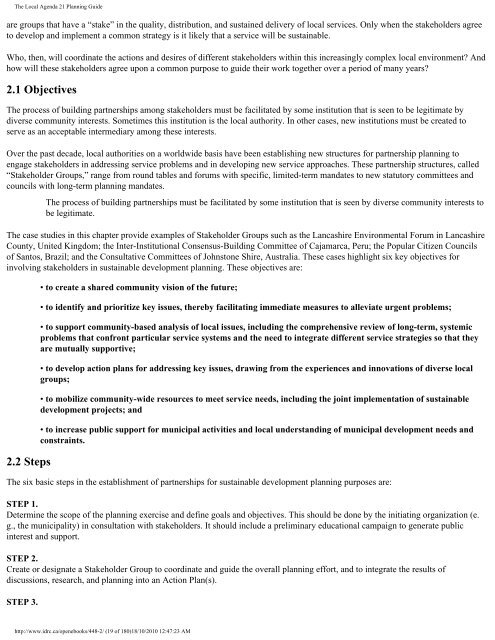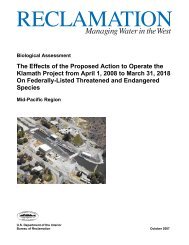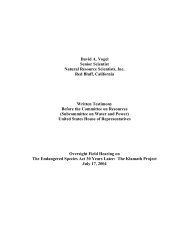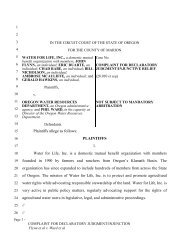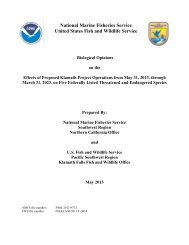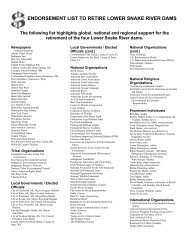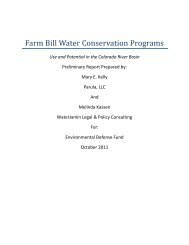The Local Agenda 21 Planning Guide - Democrats Against UN ...
The Local Agenda 21 Planning Guide - Democrats Against UN ...
The Local Agenda 21 Planning Guide - Democrats Against UN ...
You also want an ePaper? Increase the reach of your titles
YUMPU automatically turns print PDFs into web optimized ePapers that Google loves.
<strong>The</strong> <strong>Local</strong> <strong>Agenda</strong> <strong>21</strong> <strong>Planning</strong> <strong>Guide</strong><br />
are groups that have a “stake” in the quality, distribution, and sustained delivery of local services. Only when the stakeholders agree<br />
to develop and implement a common strategy is it likely that a service will be sustainable.<br />
Who, then, will coordinate the actions and desires of different stakeholders within this increasingly complex local environment? And<br />
how will these stakeholders agree upon a common purpose to guide their work together over a period of many years?<br />
2.1 Objectives<br />
<strong>The</strong> process of building partnerships among stakeholders must be facilitated by some institution that is seen to be legitimate by<br />
diverse community interests. Sometimes this institution is the local authority. In other cases, new institutions must be created to<br />
serve as an acceptable intermediary among these interests.<br />
Over the past decade, local authorities on a worldwide basis have been establishing new structures for partnership planning to<br />
engage stakeholders in addressing service problems and in developing new service approaches. <strong>The</strong>se partnership structures, called<br />
“Stakeholder Groups,” range from round tables and forums with specific, limited-term mandates to new statutory committees and<br />
councils with long-term planning mandates.<br />
<strong>The</strong> process of building partnerships must be facilitated by some institution that is seen by diverse community interests to<br />
be legitimate.<br />
<strong>The</strong> case studies in this chapter provide examples of Stakeholder Groups such as the Lancashire Environmental Forum in Lancashire<br />
County, United Kingdom; the Inter-Institutional Consensus-Building Committee of Cajamarca, Peru; the Popular Citizen Councils<br />
of Santos, Brazil; and the Consultative Committees of Johnstone Shire, Australia. <strong>The</strong>se cases highlight six key objectives for<br />
involving stakeholders in sustainable development planning. <strong>The</strong>se objectives are:<br />
2.2 Steps<br />
• to create a shared community vision of the future;<br />
• to identify and prioritize key issues, thereby facilitating immediate measures to alleviate urgent problems;<br />
• to support community-based analysis of local issues, including the comprehensive review of long-term, systemic<br />
problems that confront particular service systems and the need to integrate different service strategies so that they<br />
are mutually supportive;<br />
• to develop action plans for addressing key issues, drawing from the experiences and innovations of diverse local<br />
groups;<br />
• to mobilize community-wide resources to meet service needs, including the joint implementation of sustainable<br />
development projects; and<br />
• to increase public support for municipal activities and local understanding of municipal development needs and<br />
constraints.<br />
<strong>The</strong> six basic steps in the establishment of partnerships for sustainable development planning purposes are:<br />
STEP 1.<br />
Determine the scope of the planning exercise and define goals and objectives. This should be done by the initiating organization (e.<br />
g., the municipality) in consultation with stakeholders. It should include a preliminary educational campaign to generate public<br />
interest and support.<br />
STEP 2.<br />
Create or designate a Stakeholder Group to coordinate and guide the overall planning effort, and to integrate the results of<br />
discussions, research, and planning into an Action Plan(s).<br />
STEP 3.<br />
http://www.idrc.ca/openebooks/448-2/ (19 of 180)18/10/2010 12:47:23 AM


